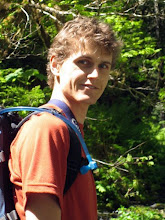Potatoes, for those of you who don't already know, are generally accepted to be the tastiest food known to our proud species. Many people, especially those coming from cultures in which the potatoes is a relatively recent addition to the agricultural and culinary repertoire, may erroneously insist that other foods (usually meats or candy) are tastier. Deep in their hearts, they know the truth.
In the States, we have several varieties of potato, ranging from the crisp Red to the gentle and delicate Yukon Gold. As with all great things, there are impostor quasi-potatoes, such as the "Sweet Potato" and the "Yam." True to our factory culture, we even have instant potatoes, designed for quick and easy consumption of a delicacy defiled. In the very near future (if not already), I am sure we will see some sort of synthetic potato which, due to it's artificial nature, will invariably be a smash hit. But all of these, base or refined, are ruled in the States by the great Idahoan Spud: the Russet.
The Russet is the most common potato grown and consumed in the States, despite it's excessive starchiness, it's deficient aroma, it's unwieldy size, and it's unappealingly bland color. The Russet is a proud and indefatigable tyrant of the American potato realm. Inexpensive as it is, the Russet's dominance in the States seems to be supported by those who prefer to consume life, rather than to savor it. As evidence, I direct your attention to the American term "couch potato," which likens the potato (potato, in this case, synonymous with "Russet") to something bland and tasteless, which usually fails stirs the imagination and depends only the stimulation of the most basic and primitive senses.
Thankfully, there are places in the world where the potato has escaped the cold and tiresome grasp of the Idahoan Russet. In the Andes of South American fame, from whence these tubers came, one can find valleys filled with hundreds of varieties of potato, each with it's own distinctions. Other places in the world had to import this excellent plant, usually introducing one a handful of varieties. (We are all familiar with the horrific results of the Irish depending on only a single variety -- further evidence of the potato's importance.) The French, known for their highly-developed culinary arts, called the potato a fruit (pomme de terre), suggesting the rather elevated nature of the tuber.
In Moldova, I have discovered a culture that has introduced only the highest forms of the potato into their agricultural and culinary cultures. Small, yellow-tinted, and slightly soft to the touch, these thin-skinned and richly-flavored potatoes most closely resemble miniature Yukon Gold. Moldovans usually prepare their potatoes by frying (cartofi prajiţi) or by mashing (cartofi piure). It should be noted, however, that the mashed potatoes are unusually tasty. Lacking garlic, they cannot be compared to the splendor of my mother's mashed potatoes, nor to the debauchery of my 7-potato puree. The excellence of Moldovan mashed (or fried) potatoes rests entirely in their simplicity -- that is, in the potato, itself.
These potatoes are the great artists of the potato world, rivalled perhaps only by certain isolated varieties in the Andes. Boil Moldovan potatoes, and the skins practically peel themselves (unless you are me, in which case you can't peel one to save your life). Fry them, and they produce the most delectable aroma. To bake such a potato would be spit on its glory. Used in pastries and salads, they are the prime attraction. I can only imagine what heavenly delicacy a bread from these starchy spuds might produce.
Indeed, while families and defiant individuals across the USA slowly divine the value of potatoes of such appetizing quality, I bask in the under-appreciated glory of the Moldovan tuber.
Happy. Thank you. More Please.
13 years ago

